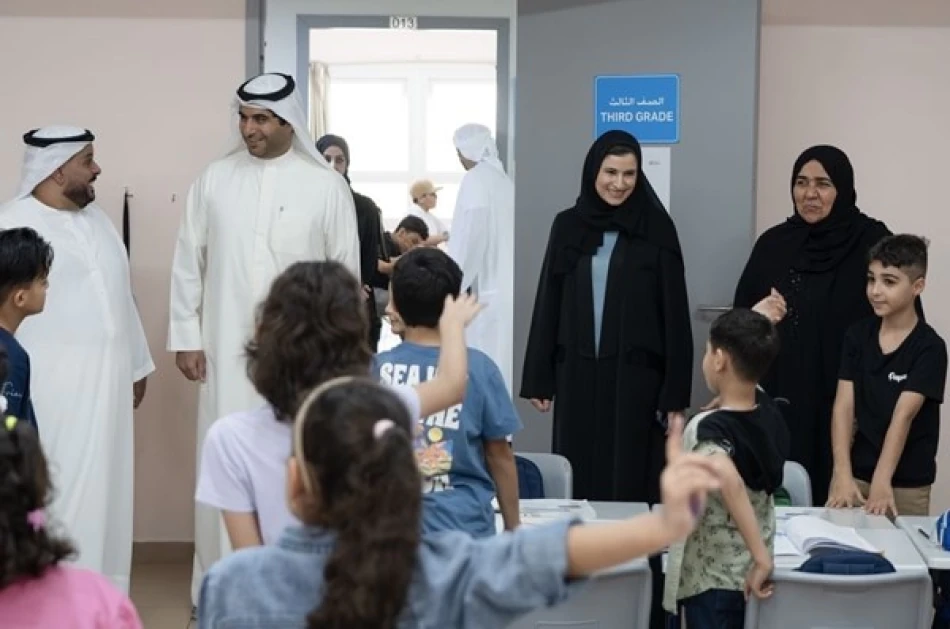
Emirati Women Shine: Remarkable Presence in the Education Sector
UAE Women Drive Educational Innovation as Nation Builds Knowledge Economy Leadership
Emirati women are spearheading a transformation in the UAE's education sector, occupying senior positions in universities, research centers, and policy-making bodies while leveraging artificial intelligence and data analytics to enhance educational outcomes. Their leadership reflects the nation's strategic pivot toward becoming a global knowledge and innovation hub, with implications extending far beyond traditional academic boundaries into economic competitiveness and technological advancement.
Strategic Leadership in Educational Policy
Dr. Samira Abdulrahman Al Mulla, Acting Director of Academic Policy, Planning and Lifelong Learning at the Ministry of Higher Education and Scientific Research, exemplifies this trend. Her portfolio includes developing the National University Classification Framework and leading AI integration programs across higher education institutions.
Al Mulla's approach demonstrates how educational leadership has evolved beyond traditional administrative roles. Her National Observatory for Food and Water Security project, which won recognition as the best project in its category, illustrates the intersection of academic research with national security priorities—a combination increasingly vital as nations face resource scarcity challenges.
Data-Driven Educational Transformation
The emphasis on data analytics platforms for educational decision-making represents a significant shift toward evidence-based policy formation. Al Mulla's work in this area, combined with her academic output of over 680 scientific citations and an H-index of 9, bridges the gap between theoretical research and practical implementation.
This approach mirrors successful educational modernization efforts in Singapore and South Korea, where data analytics have been instrumental in improving educational outcomes and maintaining global competitiveness rankings.
International Recognition and Quality Assurance
Azza Khalfan Al Shehyari, Director of Higher Education Qualifications Recognition Services, focuses on international credential recognition—a critical component as the UAE positions itself as a regional education hub. Her work involves integrating modern technologies, including AI, to accelerate qualification verification processes.
This technological integration addresses a practical challenge facing many international education hubs: efficiently processing and validating credentials from diverse global educational systems. The UAE's approach could serve as a model for other nations seeking to attract international talent while maintaining educational standards.
Global Competitiveness Through Quality Control
Al Shehyari's emphasis on building globally competitive graduates through quality assurance reflects broader economic imperatives. As the UAE diversifies its economy beyond oil dependence, human capital development becomes increasingly crucial for sectors like technology, finance, and renewable energy.
The focus on cultural understanding and international communication in credential recognition processes also supports the UAE's role as a bridge between Eastern and Western educational paradigms, potentially attracting students and professionals from both regions.
Innovation in Academic Standards
Fatima Ahmed Al Hammadi, Senior Program Development Specialist at the Academic Accreditation Commission for Higher Education, represents the entrepreneurial dimension of educational leadership. Her work includes launching initiatives supporting young entrepreneurs within educational frameworks.
This integration of entrepreneurship education reflects global trends seen in countries like Israel and Estonia, where startup ecosystems are closely linked to academic institutions. Al Hammadi's approach suggests the UAE is building similar connections between higher education and economic innovation.
Future-Oriented Educational Design
Al Hammadi's perspective on education as a foundation for innovative and sustainable society building aligns with the UAE's Vision 2071, which aims to make the country the world's best by its centennial. Her work in developing comprehensive educational policies supports this long-term strategic vision.
The emphasis on preparing graduates who can shape the future rather than merely adapt to it represents a philosophical shift toward proactive rather than reactive educational planning—a approach that could prove decisive in maintaining competitiveness in rapidly evolving global markets.
Implications for Regional Education Leadership
The UAE's investment in women's educational leadership creates several competitive advantages. First, it maximizes human capital utilization in a relatively small population. Second, it positions the country as a progressive destination for international students and faculty. Third, it supports knowledge economy development through diverse leadership perspectives.
Compared to regional competitors, the UAE's approach appears more systematic and technology-integrated than traditional models. While countries like Saudi Arabia are also investing heavily in educational transformation, the UAE's emphasis on AI integration and international credential recognition suggests a more globally-oriented strategy.
The success of these initiatives will likely influence educational policy across the Gulf region and could establish new benchmarks for knowledge economy development in emerging markets worldwide.
Most Viewed News

 Layla Al Mansoori
Layla Al Mansoori






